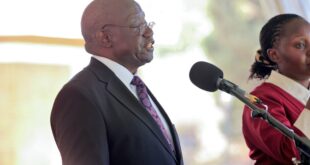Kyampisi Sub County, Mukono- The Chief Administrative Officer (CAO) of Mukono District, Mr. Ddamba Henry, conducted a support supervision visit to Kyampisi Sub County and Nakifuma–Naggalama Town Council aimed at strengthening human resource management, monitoring government program performance, and assessing budget discipline. During the visit to Kyampisi Sub County, Mr. Ddamba inspected ongoing and completed government projects, including pit latrine …
Read More »Uganda Martyrs SS Namugongo Shines as S4 Candidates Excel with Flying Colours
By Our Reporter Uganda Martyrs Secondary School Namugongo has registered outstanding performance in the 2023 Uganda Certificate of Education (UCE) examinations. The Head Teacher, Rev. Fr. Henry Kasasa, applauded the Senior Four candidates for their exceptional results. He made the remarks during a thanksgiving Mass held at Uganda Martyrs Basilica Namugongo, attended by candidates, parents, and teachers. Rev. Fr. Kasasa …
Read More »A decade of Earnest Rubondo’s leadership at PAU
Ernest Rubondo Kampala, Uganda | THE INDEPENDENT | After ten years at the helm of the Petroleum Authority of Uganda (PAU), Ernest Rubondo is stepping down, leaving behind a legacy that has significantly shaped Uganda’s oil and gas sector, even before the first barrel of oil is produced. He will officially leave office in August 2026 when his contract expires. The …
Read More »Majority of Candidates Say Exam Was Fair and Within Syllabus – Survey
Ntinda, Kampala – A nationwide post-examination survey has revealed that the majority of candidates were satisfied with the quality and fairness of the recently concluded examinations. UNEB Executive Secretary Mr. Dan Odongo(courtesy photo) According to findings from a random sample done by Uganda National Examination Board (UNEB), out of 36,546 candidates drawn from 118 districts across the country, nearly half …
Read More »Principal Judge Abodo Pledges Support to Strengthen International Crimes Division
Kampala– The Principal Judge, Lady Justice Jane Frances Abodo, today paid a courtesy visit to the International Crimes Division (ICD) of the High Court at Lourdel Road, Nakasero, describing the engagement as a “listening tour” aimed at strengthening the Division’s working environment and operational capacity. Principal judge, Jane Frances Abodo (3rd right) with Judicial officers at ICD. (Courtesy photo) Addressing judicial …
Read More »116 Lawyers Enrolled as Advocates of the High Court, Urged to Uphold Integrity and Professionalism
Kampala – A total of 116 newly qualified lawyers have been formally enrolled as Advocates of the High Court during a ceremony held at the Court of Appeal Building Conference Hall. One of the enrolled lawyers receiving his certificate on Friday.(Courtesy photo) The enrollment was presided over by the Acting Chief Registrar, HW Lamunu Pamella Ocaya, who welcomed the new …
Read More »2025 UCE: 130 candidates score Grade E in all UCE subjects
FILE: Students sitting UCE exams Kampala, Uganda | THE INDEPENDENT | Only 130 out of 429,949 candidates who sat the 2025 Uganda Certificate of Education (UCE) examinations failed all subjects, marking the lowest full failure rate ever recorded at the lower secondary level. The 130 learners obtained Grade E, the below basic level, in every subject. Under the Competency-Based Curriculum, …
Read More »Queen Cranes Face Defining Night in Zambia as World Cup Dream Hangs in the Balance
Queen Cranes Face Defining Night in Zambia as World Cup Dream Hangs in the Balance | Voice of Bugerere HomeUncategorizedQueen Cranes Face Defining Night in Zambia as World Cup Dream Hangs in the Balance
Read More »Mungu Feni Foundation launches skills project training targeting youth and women in West Nile
Arua, Uganda | THE INDEPENDENT | Mungu Feni Foundation has launched the Weaving Hope Project, a youth and women empowerment initiative aimed at equipping vulnerable communities in West Nile with practical vocational skills and pathways to sustainable livelihoods. The project was launched in Arua District, drawing district leaders, community representatives and development partners. It focuses on vocational skills training, advocacy, inclusion, networking …
Read More »NBS’ Julius Kitone, 7 others killed in road crash on Mbarara-Lyantonde road
Lyantonde, Uganda | THE INDEPENDENT | Eight people, including a journalist, have been confirmed dead following a fatal road crash that occurred on Friday evening at Kibega 1 Village along the Mbarara-Lyantonde Highway. The accident involved a white Toyota Hiace taxi, registration number UBQ 016U, and a Mercedes-Benz Actros trailer, registration numbers KDQ 668L / ZH 5133. One of the deceased …
Read More »Uganda’s Mufti Leads Special Prayers for Late Saif al-Islam Gaddafi at National Mosque
KAMPALA, February 13, 2026 — The Mufti of Uganda, Shaban Ramadhan Mubaje, on Friday led hundreds of Muslim faithful in special prayers for the late Saif al-Islam Gaddafi, son of former Libyan leader Muammar Gaddafi. Some of the Muslims who participated in the prayers. The prayers were conducted shortly after Juma (Friday congregational) prayers at the Uganda National Mosque, a …
Read More »Mukono Strengthens Revenue Systems Through Community Engagement Drive
Mukono District Local Government, with support from the Greater Kampala Metropolitan Area Urban Development Program (GKMA-UDP), has intensified local revenue education and mobilisation efforts across Kyampisi, Nama, and Nakisunga sub-counties. The sensitization engagements, conducted from February 3 to 10, 2026, brought together business owners, traders, local leaders, security personnel, and political representatives. The initiative aimed to deepen understanding of tax …
Read More »UAPA Renews Call for Enactment of Alcohol Control Bill After Baseline Study Reveals Alarming Findings
By Kabuye Ronald The Uganda Alcohol Policy Alliance (UAPA) has renewed its call for the enactment of the Alcohol Control Bill following the release of a baseline study that reveals alarming evidence about the impact of alcohol consumption in both urban and rural areas of Uganda. Speaking during the Alcohol Baseline Study validation meeting held at Fairway Hotel in Kampala, …
Read More »Millions to get connected as NWSC expands Katosi water network to North Kampala
KATOSI, Uganda — The government of Uganda, through the National Water & Sewerage Corp. and the French Development Agency, or AFD, is in the final stages of an expansive network project to connect millions of Ugandans to the Katosi water supply. French Ambassador Virginie Leroy on Thursday toured the project and emphasized that the French-funded Package 2B project is a …
Read More »First term for Senior Five to begin March 5, 2026
Kampala, Uganda | THE INDEPENDENT | Senior Five first term will begin on Thursday, March 5, 2026, the Ministry of Education and Sports has confirmed. The announcement was made by Education Minister Janet Museveni while releasing the 2025 Uganda Certificate of Education (UCE) examination results. The reporting date departs from the usual practice of opening school terms at the start of …
Read More » Xavier Radio Ug News 24 7
Xavier Radio Ug News 24 7














